Final Fantasy 7 Rebirth review: Iconic entry is reborn anew in stunning style
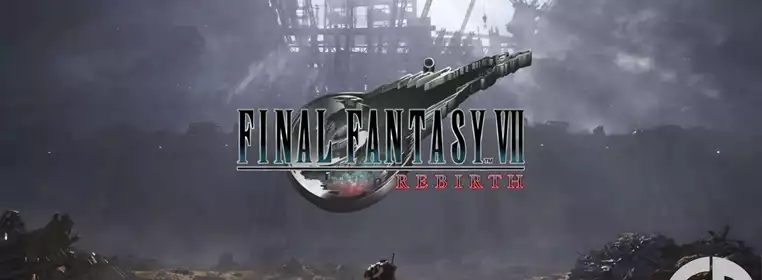
2020's Final Fantasy 7 Remake laid out not only an incredibly anticipated rejuvenation of one of gaming's greatest works, but also commenced what has become perhaps the most intriguing reimagining of the 'remake' process that we've come to understand.
People began to understand that this three-game project wasn't a repurposing of the 1997 original story with fancy new graphics, but a new envisioning on its own - so much so that people started to perhaps suggest it as a sequel.
This rapturously continues within Final Fantasy 7 Rebirth, emerging as one of the most intriguing and ambitious games I've ever played in how it responds to (and rewrites) its own history. Truly, it's everything that you'd want and expect from a series as legendary and important as Final Fantasy, and lives up to both the legacy of the original and its 2020 predecessor.
GGRecon Verdict
Final Fantasy 7 Rebirth is a monumental achievement that truly challenges the notion of what a remake can and should be. It consistently challenges and moulds its own legacy, and possesses a wide and varied cast that you will genuinely build a loving connection with.
Moreover, it innovates further on what was already one of the best combat systems out there, introducing new mechanics that allow you to really synergise with your party. You'll likely see the hours speed by when exploring the world and its many activities too, and the sheer wealth of minigames is overwhelming in the best possible way.
Rebirth and rejuvenation
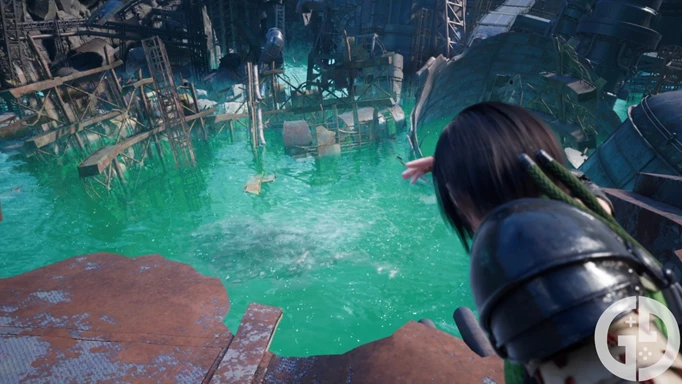
 Click to enlarge
Click to enlargeFinal Fantasy 7 Rebirth follows on from the collapse of Midgar's Sector 7 plate, releasing our party from the chains of the Shinra-dominated city into the vast open world of Gaia. While Rebirth largely follows the same structure of the original's first disk post-Midgar, it's been significantly fleshed out into two categories: expansion and reinvention.
Expansion takes form in the densely populated open areas and within the more linear sections of the game, bringing new challenges for Cloud and the gang to tackle. This encompasses the abundance of World Intel that you can collect, the wonderfully overwhelming number of minigames to lose hours within, countless heartfelt side quests to complete, and so much more.
Admittedly, there are fleeting moments where it feels a little too obvious that this is one game being stretched into three, but these boil down to single actions that feel a bit too slow as opposed to any larger structural issues (and are few and far between).
While expansion is natural when a 35-hour game is reproduced across three titles of equal or greater length, what truly elevates these key additions to new heights is the intimate relationship that Rebirth holds with its origins.
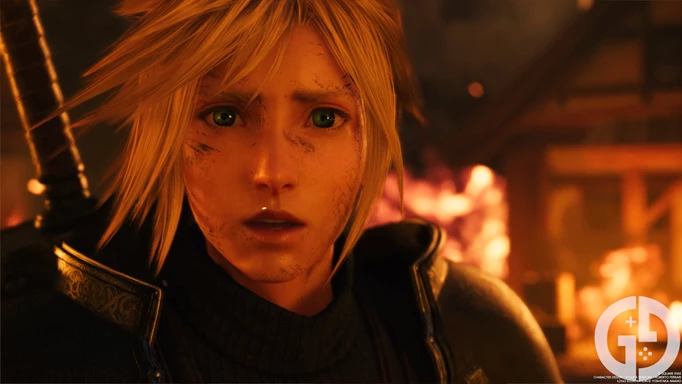
 Click to enlarge
Click to enlargeIt's a game that's fundamentally in dialogue with its history and its distinct iconography within the Final Fantasy series and gaming as a whole, truly functioning as both a sequel and a remake at the same time.
It can be easy for structures like this to slip into the self-referential metanarrative that deems only to allude to what we already know or point fingers at the past, but Rebirth actively avoids this and instead steps into a mature and deeply dense interrogation of the original game's legacy.
There's a fundamentally painful emotion of predestination flowing through the current of Rebirth's every frame, where it's actively playing on our knowledge of events - to the point where it actively infects the characters themselves.
It dares to ask whether history can - or perhaps even should - be retold, and astutely engages with the separation of free will and fate.
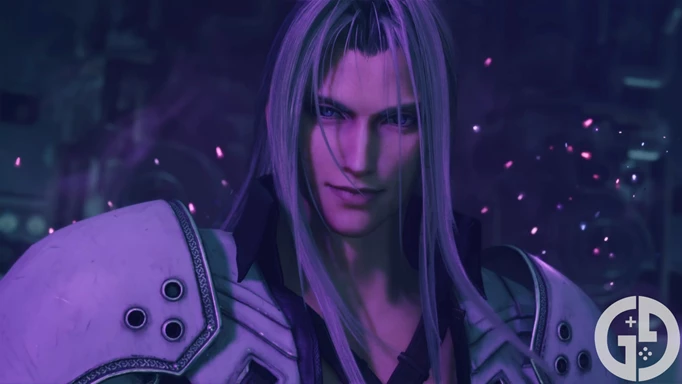
 Click to enlarge
Click to enlargeAfter all, a remake's fundamental purpose is largely understood to bring something into the 'modern age', but Rebirth, and the Remake trilogy as a whole, seems to link with its source material in juxtaposition instead of usurping it.
You could still think that Rebirth is as magnificent as it is without having played the original Final Fantasy 7 (and many of its subsidiaries) but you'd be missing out on so much of what makes it feel monolithic when set against the wider gaming world.
It's honestly tricky to articulate the many bold moves taken within Rebirth while tip-toeing around so many of its most important plot points, where it almost becomes more enthralling to find out what's kept the same instead of being changed. It remains a true feat of a remake to have each moment remain so breathtaking despite technically knowing how it all should play out.
Life of the party
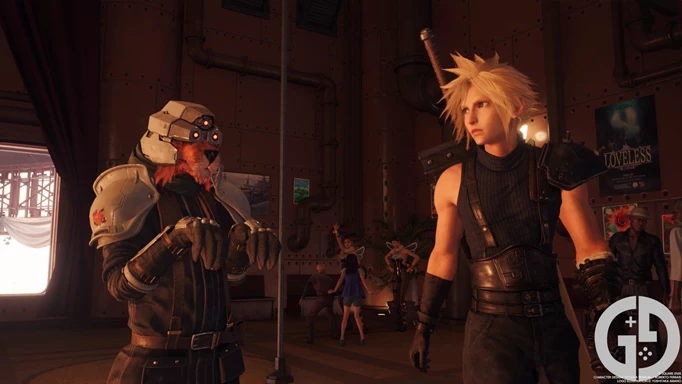
 Click to enlarge
Click to enlargeSo many of these changes wouldn't be anywhere near as affecting without the deeply emotional connection you hold as a player to every single member of the game's central party.
The State of Play showcase for Rebirth quite boldly stated that "no other game makes you feel quite this close to its characters," and while statements like that can often feel hyperbolic, it hits the nail on the head here.
It helps, of course, that we have nearly three decades of history to build upon alongside the foundation that's built within Remake, but it's frankly astonishing how well-formed each character is here. In truth, I feel like it'd be near impossible not to fall in love with them, and each is fundamentally at the emotional heart of the game's outstanding narrative.
One of the key components of this is the contrast that you'll find between party members. Cloud's unsociable reservation is wonderfully set against the earnest joy of a character like Aerith, the comedic heart of Barret, and the determination and lovingness of Tifa.
New additions to the party only strengthen this further too, as someone like Yuffie adds so much fun and joy to every single scene - and I had tears of laughter and sadness in so many of Red XIII's finest moments.
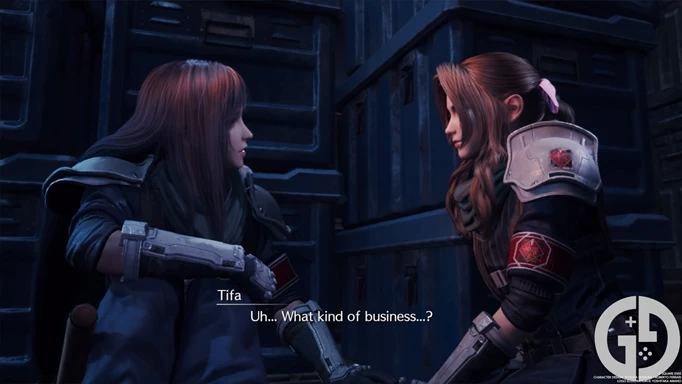
 Click to enlarge
Click to enlargeSomething that also stands out beyond the characters as individuals is the endearing collective of the party itself, where you truly feel the bonds between each of the characters. It makes me happy to see the unbreakable friendship between Aerith and Tifa - especially when it would be so easy and cheap to pit them as rivals for Cloud's attention, and the detail in how each party member moves around each other feels like family.
It's wonderful to see a game so sincere in its love for each character, embedding itself both within the ridiculously fun and lighthearted without losing anything when it comes to the more emotionally weighted moments. Rebirth effortlessly weaves between these moments and the true sign of how well it has achieved the realisation of actual people.
Rebirth is a cinematic story after all, and it does so much within the sheer abundance of wonderfully crafted cutscenes. From smaller character-focused moments that reveal so many new layers, to large and extravagant set pieces, you'll be hard-pressed to forget a single second.
Staggeringly good combat
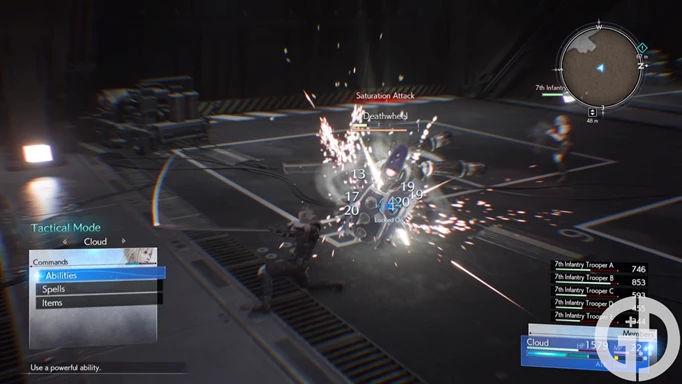
 Click to enlarge
Click to enlargeWhile it's still largely the same combat system introduced in Remake with a few key additions, that doesn't mean it's any less thrilling, perhaps serving as the blueprint of what modern Final Fantasy combat should be.
The real-time action and party-based command hybrid that continues into Rebirth is the best way to preserve the heritage and identity of the series in a modern setting.
You retain some of the strategy of turn-based combat, where you pick from a variety of different moves that all serve a separate purpose, and take into account various elemental weaknesses to build up an enemy's stagger meter. This loop endures as perennially engaging, making both the grandest boss fights and the lowliest grunt a joy to fight.
There is still a bit of frustration when it comes to ATB gain in some scenarios - particularly when facing flying enemies or fighting on your own, as you can find yourself stuck in a loop of needing ATB to do anything, but not being able to build it in the first place.
Overall this isn't too prevalent of a problem, and the synergy achieved by the variest cast of party members more than makes up for this in most scenarios. While I can see it frustrating some players, I enjoyed how often the game forces a switch of your party - encouraging you to try new playstyles and combinations that you might not have otherwise encountered or experimented with.
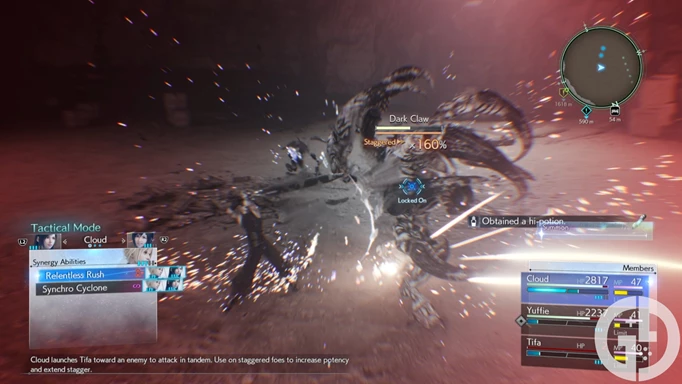
 Click to enlarge
Click to enlargeOne aspect central to this enjoyment is the new Synergy Abilities that allow you to link up two party members in an extremely powerful attack. These give you the opportunity to extend an opponent's stagger, split your ATB meter into three bars, or even raise your limit level.
Not only are these effective in battle, but they're also an absolute joy to experience from a visual perspective. Each Synergy Ability has its bespoke cutscene to see, and sometimes I found myself activating them just to watch the incredible action unfold.
A whole new world to explore
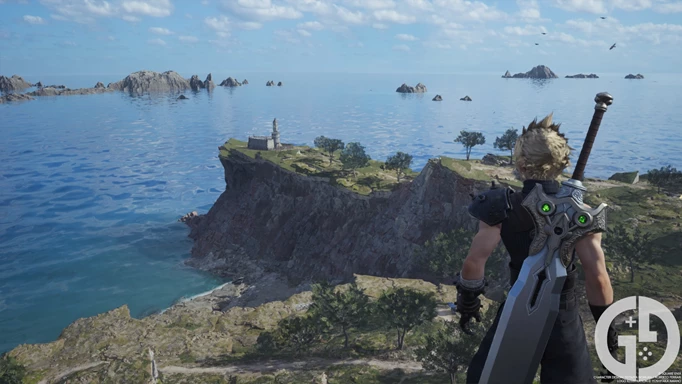
 Click to enlarge
Click to enlargePerhaps the biggest shift between Remake and Rebirth is the shift to an open world, filled with plenty for you to find and explore. Heading up the main part of the activities though is the various 'World Intel', laid out by Chadley who returns once more.
In essence, these largely surmount to 'go here, do this' type activities that I've grown tired of in other similar open-world style titles, but they manage to remain engaging throughout and feel more than just a box-ticking activity.
Part of this comes from how you'll engage with the landscape to find many of these activities - as the later areas especially have you employing your various modes of transportation to unlock the world like a puzzle.
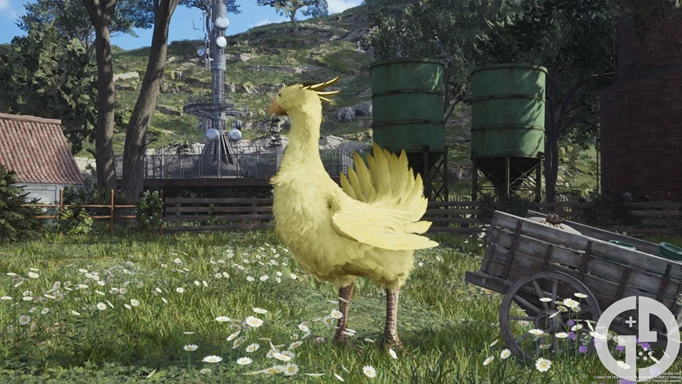
 Click to enlarge
Click to enlargeThe many side quests that you'll undertake in each area somewhat operate in the same way, in that they feel much greater than the sum of their parts. Once again you won't find yourself doing anything too out of the ordinary when it comes to each side quest, but they feel so thoroughly captivating and a joy to complete because the stories that engulf the actions are so endearing.
Stories even find themselves in the countless minigames, with the star of the show being the utterly brilliant Queen's Blood - which is the most fun I've had with a game within a game since The Witcher 3's Gwent.
It's ridiculous how many hours I ended up losing during my playthrough to Queen's Blood, and I'd drop everything that I was doing as soon as a new combatant was available to challenge. It's relatively simple to understand, but challenging to master, like any good card game - and gives you near-endless freedom to customise your deck until you reach the ideal combination of cards.
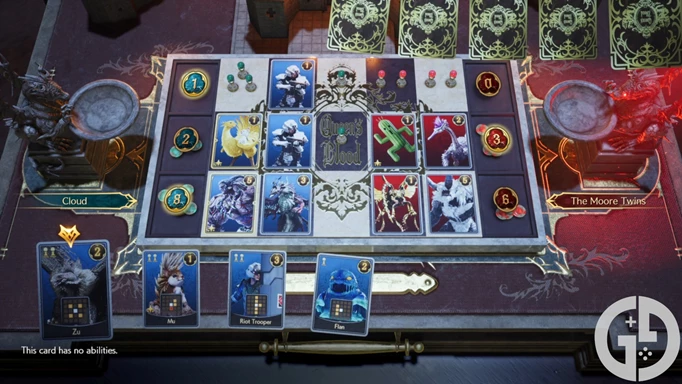
 Click to enlarge
Click to enlargeThe world of Gaia itself is stunning and Rebirth emerges as a contender for one of the best-looking games I've ever played. It's a relief to see the sheer variety of environments on offer here in opposition to Remake's Midgar-confined setting, and I found myself so easily lost within the wonder of Gongaga's lush forest or Cosmo Canyon's vast cliffs.
While the game does look utterly fantastic at the best of times, I was consistently plagued by frustrating levels of overexposure with no way to lower the brightness at all. Some pivotal scenes found themselves baked in the pure white of the sun, and moving from interiors to the outside world in most areas felt like I'd been hit by a flashbang at times. This could very well be patched down the line, but it's something that I wish wasn't an issue as it often hides how great the game truly looks.
The Verdict
Final Fantasy 7 Rebirth is one of my favourite games that I've played in a long time and does so much with its narrative that feels uncompromisingly ambitious and fresh.
It's to nobody's surprise that arguably the best moments of one of the medium's most critically acclaimed titles make a rather excellent game, but Rebirth is unafraid to mould its source material into something wholly new that acts as a reflection of the past both in and out of diegesis.
Outstanding combat and a world full of exciting opportunities only further my love for the game, and while there are short-lived instances where things feel a teensy bit tedious, these are but moments in an experience that feels genuinely monumental.
5/5
Reviewed on PlayStation 5. Review code provided by the publisher.
